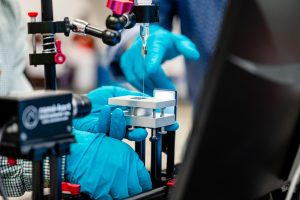Just as building a better battery is key to the future of the electric vehicle (EV), so is developing next-generation materials to protect them.
Carbon nanotubes (CNTs) — atom-thin rolls of carbon that are stronger than steel and lighter than aluminum — have the extraordinary properties necessary to create strong, lightweight, safe casings for lithium-ion batteries, the most common type of EV battery.
But when CNT-based composites are made by conventional processes, some of those remarkable properties, including superior strength, are lost in translation from the laboratory to real-world use.
To bridge that gap, Hongjun Zeng, Ph.D., a member of Chain Reaction Innovations (CRI) Cohort 5, is developing technology to produce CNT-polymer composites that maintain the exceptional mechanical, thermal, and electrical properties of carbon nanotubes. In 2021, Zeng co-founded Adaxius with Neil Kane to develop a family of nanocarbon-based composite materials.
Composites are emerging as a replacement for traditional materials like steel and aluminum that are energy-intensive and expensive to produce.
“By maintaining CNT properties, our vision is to make a composite structural material stronger than steel but lighter than aluminum with better thermal conductivity than copper,” Zeng said. “With EV battery casings, for example, the material must be very strong, very safe, and very tough so the vehicle can drive at high speeds, at high temperature, without problems.”
CNT-polymer composites have other clean-energy applications, including wind turbine blades and vessels used to store and transport hydrogen for uses including powering cars, Zeng says. The innovation also has aerospace applications.
Zeng, who joined CRI’s Cohort 5 in June 2021, is developing this technology during the two-year entrepreneurship program at the U.S. Department of Energy’s (DOE) Argonne National Laboratory. CRI embeds innovators in the Lab to help them refine and de-risk their early-stage technologies.
Zeng’s CRI research builds on his work as director of research developing novel thin-film diamond products for industrial applications at Advanced Diamond Technologies, Inc. which Kane co-founded in 2003 to leverage pioneering technology developed at Argonne.

Energy Efficiency
Zeng’s breakthrough material aids energy efficiency by helping reduce the weight of heavy products like EV car batteries and hydrogen vessels, which eat up extra energy. While a regular car battery weighs roughly 40 pounds, EV batteries, which need to store large amounts of energy, can weigh 1,000 pounds or more, depending on the vehicle. When made of steel, hydrogen vessels used for transport and storage weigh roughly 150 pounds.
Using Zeng’s lightweight carbon-polymer composites for battery casings can reduce the weight of an EV battery by 20 to 30% and the weight of a hydrogen vessel by 40% or more, improving energy efficiency for both. Composites also contribute to reducing the weight of the battery pack.
The technology also has next-generation features like compatibility with smart manufacturing that uses automation, analytics, and computerized controls to minimize costs and maximize productivity.
How It Works
Composites have two components: a high-performance fiber such as carbon for reinforcement, and a matrix, such as a polymer, that binds the elements together. In the lab, CNT-polymer composites have proven highly effective. Although these composites are eight times stronger than steel, they have an Achilles heel.
When CNT-polymer composites are scaled up for real-world use, tiny defects in the material, or microvoids, are difficult to eliminate. The defects have small impact on applications for sporting equipment like fishing poles or tennis rackets. But when products like high-speed vehicles and aircraft operate during extreme conditions with high pressure, speed, or temperature, these defects can cause catastrophic accidents.
The root of the problem lies with an incompatibility between the carbon nanomaterials and the polymers. This creates weak and uneven bonding between them, Zeng said.
“Because of the incompatibility, removing defects such as microvoids between the carbon reinforcement and the polymer matrix is almost impossible,” Zeng said.
The Adaxius technology uses a unique surface engineering process on the nanoscale with extremely high uniformity, enabling the integration of the carbon reinforcement and polymers. The integration is so strong it reduces the surface tension that can lead to defects in the material.
Still in the early stages, Zeng says the technology is showing impressive results.
“Our preliminary experiment has demonstrated that composites’ ultimate strength and toughness have increased by between 40 and 450% without adding extra weight compared to other composites manufactured using current methods,” said Zeng. “At the same time, the cost is comparable with the commercial equivalent.”
Moving Forward
An expert in micro- and nanofabrication with a strong physics background, Zeng is expanding on his area of expertise working with Jeff Elam, Senior Chemist/Group Leader and Argonne Distinguished Fellow, in Argonne’s Applied Materials Division.
“I am learning about nanosurface engineering and developing materials by working with Jeff and his team,” Zeng said. “Having access to Argonne’s industrial-scale reactors has given me the opportunity to scale up the product and test its viability and producibility. Argonne’s resources offer a bridge between research lab tools and industrial tools.”
Zeng finished the proof-of-concept and is now prototyping his innovation in the Lab. In his second year at CRI, Zeng, who has 15 patents, will focus on commercialization and development. Based on his CRI work, Zeng received a $256,000 Phase I SBIR Grant from the National Science Foundation, which he will use to research aerospace applications based on the technical platform built in the CRI program.
“We’re in the early stages of applications like batteries and hydrogen tanks,” Zeng said. “Our near-term goal is to apply the technology to aviation or aerospace which is less cost sensitive.”

